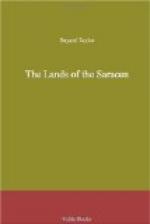I found tolerable quarters in a house on the plaza, and took the remaining hour of daylight to view the town. The people looked at me with curiosity, and some boys, walking on the edge of the tajo, or precipice, threw over stones that I might see how deep it was. The rock, in some places, quite overhung the bed of the Marchan, which half-girdles its base. The close scrutiny to which I was subjected by the crowd in the plaza called to mind all I had heard of Spanish spies and robbers. At the venta, I was well treated, but received such an exorbitant bill in the morning that I was ready to exclaim, with King Boabdil, “Woe is me, Alhama!” On comparing notes with Jose, I found that he had been obliged to pay, in addition, for what he received—a discovery which so exasperated that worthy that he folded his hands, bowed his head, made three kisses in the air, and cried out: “I swear before the Virgin that I will never again take a traveller to that inn.”
We left Alhama an hour before daybreak, for we had a rough journey of more than forty miles before us. The bridle-path was barely visible in the darkness, but we continued ascending to a height of probably 5,000 feet above the sea, and thus met the sunrise half-way. Crossing the llano of Ace faraya, we reached a tremendous natural portal in the mountains, from whence, as from a door, we looked down on all the country lying between us and the sea. The valley of the River Velez, winding among the hills, pointed out the course of our road. On the left towered over us the barren Sierra Tejeda, an isolated group of peaks, about 8,000 feet in height. For miles, the road was a rocky ladder, which we scrambled down on foot, leading our horses. The vegetation gradually became of a warmer and more luxuriant cast; the southern slopes were planted with the vine that produces the famous Malaga raisins, and the orange groves in the sunny depths of the valleys were as yellow as autumnal beeches, with their enormous loads of fruit. As the bells of Velez Malaga were ringing noon, we emerged from the mountains, near the mouth of the river, and rode into the town to breakfast.
We halted at a queer old inn, more like a Turkish khan than a Christian hostlery. It was kept by a fat landlady, who made us an olla of kid and garlic, which, with some coarse bread and the red Malaga wine, soon took off the sharp edge of our mountain appetites. While I was washing my hands at a well in the court-yard, the mozo noticed the pilgrim-seal of Jerusalem, which is stamped indelibly on my left arm. His admiration and reverence were so great that he called the fat landlady, who, on learning that it had been made in Jerusalem, and that I had visited the Holy Sepulchre, summoned her children to see it. “Here, my children!” she said; “cross yourselves, kneel down, and kiss this holy seal; for, as long as you live, you may never see the like of it again.” Thus I, a Protestant heretic, became a Catholic shrine. The children knelt and kissed my arm with touching simplicity; and the seal will henceforth be more sacred to me than ever.




